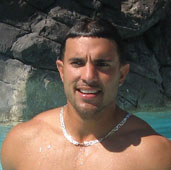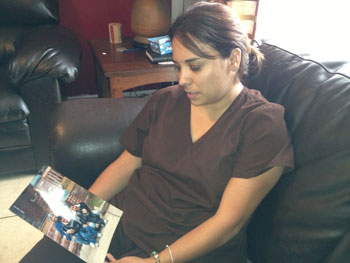By Mc Nelly Torres
Florida Center for Investigative Reporting
Kenneth Williams worked as a handyman and kept a pole in his pick-up truck just in case he came across a good fishing spot.
About This StoryThis story is the result of a collaboration between the Florida Center for Investigative Reporting and NBC6. Read more about this partnership. Media PartnerRelatedVisualized: Boating Accidents in Florida, 2011 En Español |

Kenneth Williams and his son Kenneth Jr. both enjoyed hunting and fishing in Florida. (Photo courtesy of the Williams family.)
On June 20, 2011, Williams grabbed that fishing pole and his oldest son, 9-year-old son Kenneth Jr., and headed from their three-bedroom home in Pompano Beach to the blue waters of the Atlantic Ocean. They were going fishing at Hillsboro Inlet with one of Williams’ friends, David Goodrum.
Then, sometime after 9:30 p.m., tragedy struck. Williams’ 15-foot Cobia was taking on water; it was sinking slowly into the cool, dark waters. Williams, his son and Goodrum were forced into the Atlantic.
Wearing life jackets, Kenneth Jr. and Goodrum swam north to the seawall, where they were rescued. But Williams wasn’t with them. The 36-year-old father hadn’t slipped on his life jacket and was swept away by the strong ocean current.
Kenneth Jr. called his mother around 10 p.m. Dad’s drowning, he told her.
“I knew he was gone the minute we got there,” Johanna Williams recalled. “There’s no way he could have survived that. Not the way the water was going.”
Her husband’s body was found the next day.
Williams was one of 67 people killed on Florida’s waterways in 2011, the most recent year for which data is available, according to an analysis by the Florida Center for Investigative Reporting and NBC6.
For years, due in part to lax regulations on safety equipment and few mandates for formal boating safety education, the Sunshine State has led the nation in boating-related deaths and injuries. The Florida Legislature has failed to address the state’s hazardous waters through additional safety requirements and mandated boater education, because year after year, the $10.3 billion Florida boating industry and the state’s boating constituents have pressured legislators to keep safety regulations to a minimum.
“Unfortunately, more innocent boaters will continue to lose their lives and their grieving family members will continue to ask, ‘Why?’ ” said Pamela Dillon, education director for the National Association of State Boating Law Administrators, a Kentucky-based organization that advocates for boating safety training. “Our elected representatives are the only ones who can answer that question.”
Lax Regulation
With 2,000 marinas, 1,700 miles of rivers, more than 3 million acres of lakes and 8,000 miles of coastline, the longest of any state in the union, Florida is a boating heaven.
The Sunshine State has more boats registered than any other state, with nearly 1 million vessels including houseboats, sailboats, powerboats, airboats and canoes and kayaks. The top four counties for boating in Florida are Miami-Dade, Pinellas, Lee and Broward, based on boat registration numbers.
In addition, more than 300,000 unregistered boats use Florida’s waterways, and according to a 2011 U.S. Coast Guard survey, 2.5 million households in the state are active boaters.
Florida’s marine industry is the largest in the country. With an economic impact of $10.3 billion, the industry employs about 83,000 Floridians.
Visualized: Deaths of Boat Operators in FloridaSource: Florida Fish and Wildlife Conservation Commission, 2011; data visualizations by Grant Smith |
But every year dozens of people are killed and hundreds injured on the state’s waters in accidents that may have been avoided had boaters received safety education and used safety equipment such as life jackets.
In 2011, the most recent year for which state data is available, 67 people were killed in boating accidents in Florida, a 24 percent increase since 2008, when 54 boaters died. Boating injuries also increased 12 percent during that time period, with 431 in 2011, up from 386 in 2008.
Nationwide, 758 people died in boating accidents and 3,081 people were injured in 2011.
Boating accidents occur for a variety of reasons, including carelessness, speeding, inexperience and intoxication. In 2011, 32 of the 67 boating fatalities in the state were of people who fell overboard and drowned. Over three-quarters of those drowning victims were not wearing life jackets.
According to state data, the most likely to die on the Sunshine State’s world-famous waters are men 35 and older who are not wearing life jackets and have no formal boating safety education.
Most of these deaths were avoidable, according to Pamela Dillon of the National Association of State Boating Law Administrators.
“If you mandate people to wear a life jacket, they might not understand why they need to do that,” Dillon said. “But when you educate them, we have a chance to influence their behavior.”
Florida only requires education for boaters born on or after Jan. 1, 1988, a percentage of today’s boaters so small that the law is without much impact in practice.
Five states – Connecticut, Alabama, New Hampshire, Massachusetts and New Jersey – and the District of Columbia require all boaters to take boating safety classes. Three other states – Washington, Virginia and Hawaii – have passed laws that will ultimately require safety education of the majority of boat operators.
In Florida and elsewhere, boating regulations, including mandating safety equipment and education, are often met with resistance from the boating industry, which fears that additional regulations will discourage boating, costing jobs and economic activity.
Michele Miller, executive director of Marine Industries Association of Florida, said regulations as simple as requiring life jackets when aboard recreational vessels would dissuade people from taking to the waters.
“They are hot and uncomfortable,” Miller said of life jackets.
No state requires all boaters to wear life jackets at all times. Connecticut and Pennsylvania, for example, require boaters in small vessels to wear them at all times only during cold-water months.
That life jackets are hot and uncomfortable isn’t in dispute, but no studies support Miller’s and the industry’s contention that requiring life jackets will discourage people from using boats. No one from the industry could provide evidence to support that assertion.
A three-year study by the U.S. Army Corps of Engineers at four lakes in Mississippi, however, suggested the industry’s claim is incorrect. During the study period beginning in 2009, boaters at those four lakes were required to wear life jackets. The safety mandate did not result in decreased use of the lake or affect local commerce. The number of annual boating deaths also decreased at those lakes when life jackets were required.
Industry Influence
Charles Flaxman is a Hollywood attorney who has represented boating accident victims for 30 years. He believes the boating industry is standing in the way of commonsense laws that would protect Florida boaters.
“Unfortunately, just as with the issue of gun regulation, it’s all about the lobby and the money,” Flaxman said. “But it’s also about politicians wanting to stay in power while being influenced by lobbyists, who tend to go against regulations.”

Former state Sen. Lee Constantine
Support for Flaxman’s claims can be found in how elected officials in Tallahassee have responded to recommendations from the Florida Boating Advisory Council, an 18-member board created to review boating-related issues and make recommendations to the Florida Fish and Wildlife Conservation Commission, the state agency that polices Florida’s waters.
Drawing on years of data showing that boating experience alone did not reduce the risk of boating accidents, the Boating Advisory Council encouraged state lawmakers in 2009 to increase the age of boaters required to take safety education courses.
“Our proposal was to increase the age in five-year increments each year,” said Capt. Richard Moore of the Florida Fish and Wildlife Conservation Commission and a staff member of the Boating Advisory Council. Under current law, only boaters 25 years old and younger must take safety education courses to be licensed for Florida’s waters.
Florida’s politically active boating industry, which has donated nearly half a million dollars to the campaigns of state legislators since 1996, quickly and forcefully opposed the recommendation.
Former state Sen. Lee Constantine, R-Altamonte Springs, then chair of the Environmental Preservation and Conservation Committee, sponsored a bill that included the Boating Advisory Council’s recommendation to require safety education for more boaters.
“I didn’t have the votes,” said Constantine, now a county commissioner in Seminole County. “I’m not saying that it was the right thing to do, but what I’m saying is that it wouldn’t pass.”
Beginning in 1999, the marine and boating industry had given $5,100 in campaign contributions to members of Constantine’s committee, which stripped out the provision that would have required more boaters to take safety courses.
Former state Sen. Carey Baker, R-Eustis, then the chair of the General Government Appropriations Committee, co-sponsored the bill with Constantine. He said the boating industry didn’t influence his vote because the bill was amended before reaching his committee. Baker had received contributions from various industry interest groups totaling $3,000 since 2005.
“There’s a thousand reasons why a bill would be amended or die,” said Baker, now the property appraiser in Lake County.

Osmany “Ozzie” Castellanos
At the end of the 2009 session, and without much notice, the weakened legislation became known as the Osmany “Ozzie” Castellanos Boating Safety Education Act, named after a 23-year-old Miami lifeguard who died on July 8, 2007, after he was thrown from a 27-foot boat carrying 12 people. He was not wearing a life jacket.
Isabel Castellanos, the young man’s mother, was disappointed that a bill named after her son would do so little to make Florida boaters safer.
“I wasn’t pleased with what the Legislature approved,” said Castellanos, who was not invited to speak with lawmakers in Tallahassee. “I wish it was stronger.”
Since current Florida law requires only boaters born on or after Jan. 1, 1988, to take boater safety courses, at least another decade will have to pass before the law catches up to the majority of the state’s boaters, who are typically in their 30s and 40s.
“If the state laws don’t require those people to be educated, then you miss the target,” said Jeffrey N. Hoedt, who heads the Boating Safety Division of the U.S. Coast Guard. “You didn’t get the people who most need that education.”
After the Accident

Johanna Williams looks at a family portrait that included her late husband Kenneth. (Photo by Mc Nelly Torres.)
Sitting in her home on a leather couch next to a picture of Kenneth Williams, Johanna Williams doesn’t like to dwell on what went wrong the night her husband of 11 years drowned off the coast of Pompano Beach.
“I try not to talk about what happened. It doesn’t help them,” she said, referring to her sons, and then paused. “It doesn’t help me.”
Kenneth stored a life jacket on his boat, but he never wore it. He also never took boating safety courses. In that way, he was the typical Florida boater, according to government data.
Williams, 36, works today as an office manager for a physician in Hollywood and raises her two sons, Kenneth Jr., now 11, and Vicente, 9, as a single mother. She admits that her husband might have survived his boating accident on June 20, 2011, had he worn a life jacket.
“People need to respect the water and understand what they are doing to make sure they are safe,” Williams said. “The lifejacket is there for a reason.”
